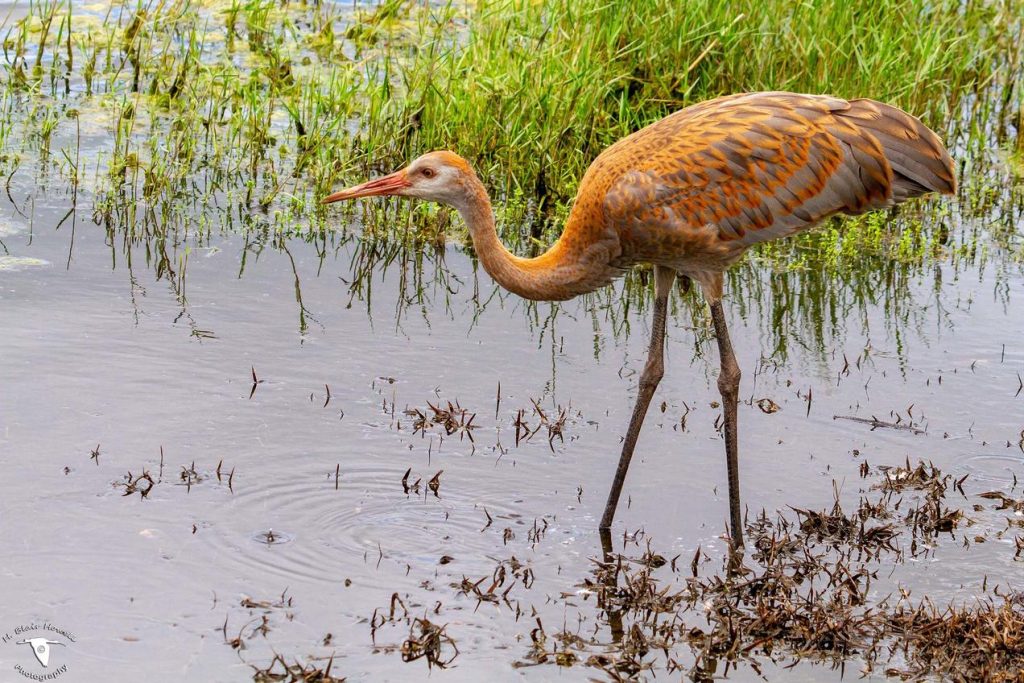Trump denies protection to imperiled wildlife, censors more climate change web pages, and stalls on a ban of a deadly chemical.

The Florida sandhill crane, along with 12 other vulnerable species, was just denied Endangered Species Act protection by the Fish and Wildlife Service. (H. Blair Howell)
See You Next Year . . . Maybe
As 2018 nears its end, so does the existence of several species. Yet the Trump administration has adopted a do-nothing approach to conservation. On Tuesday, the U.S. Fish and Wildlife Service denied Endangered Species Act protection to 13 vulnerable plants and animals. Add that to 25 denials issued in 2017. The decisions range from tragic to just plain wrong.
Among this year’s batch of Trump administration rejections is the Cedar Key mole skink, a small lizard that scurries around a low-lying island off the western Florida coast. As sea level rise threatens to wipe out its habitat, the skink faces extinction. The Fish and Wildlife Service is ignoring that concern, probably because the administration ignores all climate change–related concerns. Other species denied protection include the Florida sandhill crane, striped newt, Tippecanoe darter, as well as the San Joaquin Valley giant flower-loving fly (perhaps because saving it might impact the mining industry).
I say “probably” and “perhaps,” because much of the rationale behind these decisions is anyone’s guess. In October, the Center for Biological Diversity obtained a leaked administration memo that advised the Fish and Wildlife Service to withhold from public view many of the documents generated in its review of applications for protection. Why would the administration want to hide its internal communications about Endangered Species Act decisions? Possibly because political appointees are questioning or overriding the assessments of agency scientists, and the administration might not like the public to see that. Or maybe because the administration is considering factors that the law expressly prohibits. For example, Trump has proposed adding economic impacts to the list of considerations in deciding whether to protect a species. That’s something that would likely require an act of Congress, which is not yet forthcoming.
This stonewalling and stalling have real-world consequences. The Ozark pyrg snail, formerly of Arkansas and Missouri, went extinct while waiting for federal protection. More extinctions are on the way. This week, the Endangered Species Coalition published a list of 10 creatures imperiled by the Trump administration’s efforts to gut the Endangered Species Act.
These losses are senseless. The administration’s claims that the Endangered Species Act cripples our economy are unsupported by evidence. A 2015 review of 90,000 federal projects in which an agency consulted with the Fish and Wildlife Service to ensure that a proposal wouldn’t jeopardize a listed species showed that the endangered species rules didn’t stop, or even extensively alter, a single project. Not one.
Climate Change Yields to Politics at DOT
The transportation sector is the largest contributor of carbon emissions in the U.S. economy. So, of course, the Trump administration just removed two pages addressing climate change from the Department of Transportation website. The pages detailed both how transportation contributes to climate change and how extreme weather and other climate change–related problems damage transportation infrastructure. There were also links to scientific research, which is something Donald Trump can’t stand in the least.
A spokesperson told CNN the administration removed the pages because they were outdated. Which is kind of true—climate change has certainly intensified since the pages first went up. And the transportation sector’s share of U.S. carbon emissions is likely to increase as lower-carbon sources replace coal-fired power plants, shrinking the utility sector’s share of the pie. So the DOT spokesman isn’t technically lying. Still, I wouldn’t bother hitting “refresh” over and over again, waiting for updated pages to appear.
You Promised Us One Thing, Scott Pruitt
The paint stripper methylene chloride has been linked to more than 50 deaths in the United States alone, leading many retailers to pull the product from their shelves. It’s obviously dangerous. Its sale can’t be justified, and it should clearly be banned.
The U.S. Environmental Protection Agency proposed to do just that during the Obama administration, but the idea was shelved when Donald Trump took office. Then, in May of this year, something weird happened. Former EPA-administrator-cum-small-time-scammer Scott Pruitt suggested that the agency would consider issuing a methylene chloride ban by the end of 2018. It was the only out-of-character thing Pruitt did during his tenure. Pruitt doing something to protect public health is akin to Emperor Palpatine from Star Wars declaring a wildlife preserve on the forest moon of Endor.
Alas, as Mother Jones observed this week, there has been no discernible progress on the ban. The EPA won’t even confirm that it still plans to outlaw the deadly paint stripper.
So Pruitt rides off into the sunset with his legacy intact, boasting a batting average of 0.000. I can’t think of a single good thing he did for the public health or the environment. He didn’t even start the ball rolling on something good. Thanks for nothing, Scott.
